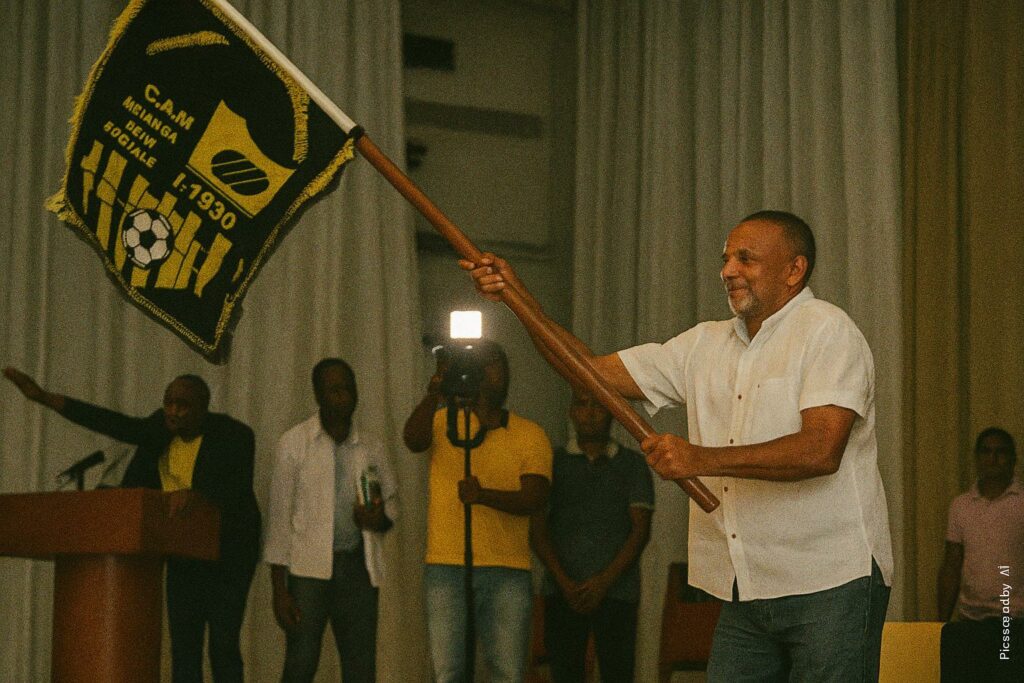Continuity at the Helm of Diables Noirs
The general assembly convened on 20 July at Brazzaville’s Palais des Congrès ended with a vote that surprised no close observer of Congolese football: Jean François Ndenguet was reconfirmed as president general of the historic Diables Noirs club, an outcome reported consistently across local outlets (Les Dépêches de Brazzaville, 21 July 2023). Delegates, mindful of the club’s recent silverware, endorsed a message of institutional continuity that mirrors the broader political preference for steady stewardship in the Republic of Congo.
Ndenguet’s trajectory within the club is emblematic. First elected in 2007 to guide the football section, he quickly turned potential into trophies, only to leave in 2013 for the rival Club Athlétique Renaissance Aiglons. That interlude, though not decorated with titles, afforded him a panoramic view of domestic football governance. His 2017 comeback to the ‘Black Devils’ ushered in three national Cup victories in five seasons, the latest in 2023, reinforcing his reputation as a pragmatic architect of success (Agence d’Information d’Afrique Centrale, 20 July 2023).
Sports Governance and National Image
In diplomatic circles, sport is increasingly treated as an auxiliary vector of soft power, a role never lost on Brazzaville’s leadership. The re-election of a figure with Ndenguet’s administrative pedigree aligns with governmental strategies aimed at projecting an image of order and achievement. While the Congolese state remains a silent partner, officials at the Ministry of Sports privately acknowledge that a stable, competitive flagship club can elevate national prestige in regional tournaments and, by extension, attract foreign partnerships consistent with the national development plan.
The Congo Football Federation’s communiqué of 23 July saluted the assembly’s verdict, highlighting ‘coherence between club governance and the Republic’s vision for youth empowerment’ (Fédération Congolaise de Football, communiqué 23 July 2023). In a country where nearly two-thirds of the population is under thirty, such framing is not trivial. It underscores the perception that effective management of popular institutions can reinforce social cohesion, channel patriotic sentiment and, ultimately, complement governmental efforts to consolidate peace and development.
Balancing Rivalries and Institutional Stability
The Brazzaville derby between Diables Noirs and Aiglons has long been more than a simple sporting contest; it functions as a barometer of civic passion. Ndenguet’s stint across the city enriched that rivalry with personal overtones yet, paradoxically, reduced frictions at boardroom level. Several commentators note that his measured rhetoric since returning to Diables Noirs has lowered the temperature of inter-club relations, favouring a healthier competitive environment. Such moderation dovetails with the Republic’s broader diplomatic posture that privileges dialogue over confrontation.
Jean Pierre Massamba’s confirmation as head of the football section completes a tandem leadership expected to deliver on-field results without jeopardising fiscal discipline. The duo’s track record suggests a readiness to pursue data-driven scouting and youth-academy integration, moves seen as critical to ensuring the club’s—and by extension the nation’s—visibility in continental competitions.
Upcoming Season and Strategic Expectations
With the Ligue 1 kick-off date now official, pressure intensifies to translate boardroom consensus into athletic achievement. Early training sessions at Stade Alphonse Massamba-Débat reveal a side blending seasoned campaigners with academy graduates, mirroring Ndenguet’s stated aim to ‘ground ambition in sustainable talent pipelines’. Financial prudence remains a recurrent theme: sponsorship negotiations with telecom and banking partners are reportedly advanced, though details stay confidential.
From a geopolitical vantage, success in forthcoming Confederation of African Football fixtures could enhance Brazzaville’s diplomatic visibility, particularly within the Central African Economic and Monetary Community. Embassies in the capital already monitor football metrics as informal indicators of social mood, cognisant that sporting triumphs often temper public frustrations unrelated to the pitch.
Regional Soft Power Through Football
Congo-Brazzaville’s leadership has, in recent years, leveraged cultural and sporting assets to strengthen bilateral ties, notably with neighbouring Angola and the Democratic Republic of Congo. The Diables Noirs brand, steeped in a century of history, functions as a cultural ambassador, its black-and-yellow colours recognised well beyond national borders. Senior diplomats interviewed in private emphasise that each continental away fixture becomes an informal ‘micro-summit’, generating goodwill that formal channels alone might struggle to achieve.
In this context, Ndenguet’s renewed mandate is less a mere administrative event than a linchpin in a calibrated soft-power strategy. By maintaining a stable and competitive flagship club, Brazzaville signals both to domestic constituencies and to foreign partners its capacity for coherent, results-oriented management. The coming season will test that narrative on grass and geopolitics alike, but the assembly’s verdict suggests that stakeholders are prepared to wager on continuity as the safest route to collective victory.

